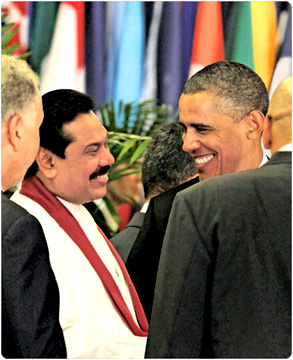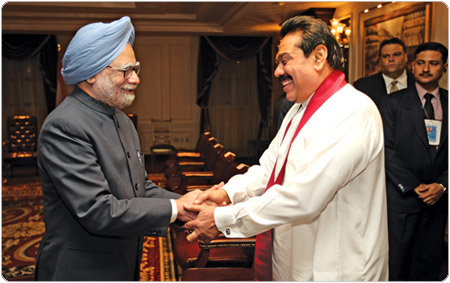Foreign relations reach a new high under President Mahinda Rajapaksa
By Manjula Fernando
 |
|
President Mahinda
Rajapaksa's foreign policy which won him many friends in all
geographical blocs has so far given the country enormous
strength to win over the LTTE battle which has now shifted to
the global arena |
|
Sri Lanka’s foreign policy under
President Mahinda Rajapaksa’s government has been robust, dignified and
self-asserting. But it has always been open for dialogue and interaction
with the international community during the difficult phases.
This was amply manifested by a comment External Affairs Minister
Prof. G.L. Peiris made at a press conference at the Ministry on November
1, wrapping up the highly successful Perth CHOGM visit. “We are no more
a colony. We are an independent state. We will not take ultimatums by
any foreign state,” he said when a question was posed at him by a member
of the media on comments made by British PM David Cameron that Sri Lanka
will be expected to show progress before the 2013 CHOGM in Colombo.
He said the Perth CHOGM visit where the 54 nation body unanimously
decided on Colombo as the 2013 CHOGM venue, and where a litigation by an
LTTE sympathiser, a publicity stunt, was quashed by the Australian
Attorney General and an attempt to drag domestic issues of Sri Lanka by
the Canadian PM was defeated - could serve as a showpiece of the
country’s outstanding foreign policy not withstanding criticism to
emphasise that Sri Lanka was a black sheep in the pack or it is on a
collision course with the Western world.
None other than the Australian PM, Julia Gillard announced that there
were no plans to relocate the CHOGM 2013, venue despite do-or-die
efforts by vested interests to defame Sri Lanka, with their campaign
starting even before the CHOGM curtain raiser.
According to Prof. Peiris 15 countries spoke on behalf of Sri Lanka
at the CHOGM meeting and ultimately it became unanimous that the venue
should be Colombo as previously decided.
International front
After the defeat of one of the most ruthless terrorist organisations
in the world, from the shores of Sri Lanka, wiping out its highly feared
military wing and all the key leaders including its supreme leader
Prabhakaran, Sri Lanka’s battle had shifted ground.
The LTTE with many faces now operate from the international front
through a highly oiled propaganda mill.
The time-to-time calls for war crimes probes and sanctions on Lanka
is the work of this lot. The rich LTTE coffers fat with black money
raised through international crime has got the Western power-hungry
politicians with bigger Tamil vote bases to sound the sirens on behalf
of them.
 And
Sri Lanka had to face the brunt of these actions in many international
fora. From the UNHRC in Geneva and UNGA in New York to CHOGM in Perth –
Western Australia. But Sri Lanka’s true friends who were reaped by its
unique foreign policy have helped defeat all such attempts in the past. And
Sri Lanka had to face the brunt of these actions in many international
fora. From the UNHRC in Geneva and UNGA in New York to CHOGM in Perth –
Western Australia. But Sri Lanka’s true friends who were reaped by its
unique foreign policy have helped defeat all such attempts in the past.
Fearless and unbending
President Rajapaksa had been courteous, but at the same time fearless
and unbending in the face of the international community. Sri Lanka,
which had been a voiceless state in the past which had to bow down to
the West’s unfair calls asserted its own right pl
ace following the appointment of President Rajapaksa as the President
in 2005. His foreign policy which won him many friends in all
geographical blocs has so far given the country enormous strength to win
over the LTTE battle which has now shifted to the global arena.
President Rajapaksa expanded relations with Cuba, Iran, Myanmar and
Vietnam. His critics were silenced when such relations began to bring in
positive results. Iran came forward with help during the oil crisis and
has assisted us enormously in the power and irrigation sectors. Under
the President’s leadership Sri Lanka braced international pressure
during the height of the humanitarian operation with great composure and
without a flinch stood up to face the allegations leveled against the
country and redeem its good name.
Diplomatic war
Our diplomatic war, in the post-conflict era, paid dividends when a
number of countries including Belgium, Croatia, Italy, UK, Korea and
Japan positively revised their travel advisories on Sri Lanka. The US
travel advisory was lifted in May 2010.
On the Asian front he was precise in balancing relations with the
regional powers, India, Pakistan, China and Russia. During the height of
the conflict, China and Pakistan, as long-standing allies of Sri Lanka
did their best not to let our armories run dry, thus helping our Forces
to continue to maintain their dominance in the battlefield. Sri Lanka’s
relations with India have strengthened by leaps and bounds after
President Mahinda Rajapaksa came to power. President Rajapaksa has made
several high-profile visits to India during the last five years and held
productive discussions with Indian leaders.He was an honored guest at
the closing ceremony of the Commonwealth Games in New Delhi, an honuor
accorded to only a select few leaders of the Commonwealth.
He has kept New Delhi apprised of the latest post-conflict
developments in Sri Lanka and India has pledged extensive assistance for
the process of resettlement and rehabilitation in the island’s North.
The Ministry of External Affairs has been working pro-actively to
implement the foreign policy objectives as elaborated in the Mahinda
Chinthana (the election manifesto) and the other directive principles of
the Government, by contributing to the national security of Sri Lanka
and the Government’s ambitious economic development plan.
UN peacekeepers
Notwithstanding the war crimes allegations leveled against Sri Lankan
Forces, the country has been a regular contributor to UN peacekeeping
missions, which attests to the high standards of discipline maintained
by the Forces.
Although the critics bad mouthed Mahinda - foreign policy, the
actions say a different story all together. In curtailing LTTE
activities overseas the contribution made by the Western bloc is second
to none and highly impressive.
There have been arrests of LTTE operatives in the recent past in
Canada, US, UK, the Netherlands, Switzerland, Malaysia, Thailand and
Germany.
Most of these suspects were convicted and jailed for working on
behalf of the LTTE, a designated terrorist group in most places.
This was long after the conflict ended in Sri Lanka in May 2009. The
counter LTTE activities supported by foreign law enforcing authorities
continue to-date unabated.
Sri Lanka did not bow down to the European Union’s unacceptable and
intrusive conditions and instead reassured its industries that the
Government will not let down even if the GSP plus concessions were not
renewed by the EU.
The US GSP concessions which were temporarily halted, were
reactivated and Sri Lanka will have this benefit till 2013.
Although defeated as a military outfit, the LTTE’s overseas
infrastructure remains almost intact with assets such as a highly
sophisticated international communication network, working overtime to
establish a ‘transnational government’ of ‘Tamil Eelam’.
These LTTE operatives’ latest ploy is to brand Sri Lanka as a ‘war
criminal’ and harness support from sympathetic groups and nations to
help establish its dream homeland that could not be achieved through 30
years of bloodshed. Sri Lanka’s foreign policy will be a key factor in
defeating this new threat of LTTE on the global front. |